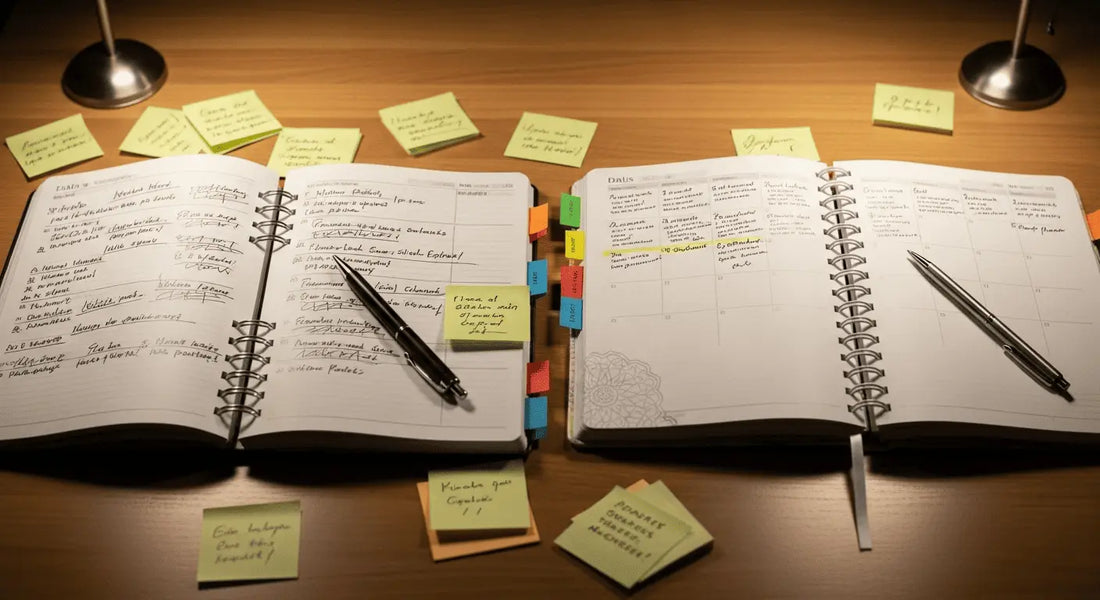
5 Common Planner Mistakes & How to Fix Them
Share
Introduction
You can increase your daily productivity by using a planner, but only if you use it properly. Many people enthusiastically purchase planners, only to give them up weeks later when they don't see any improvement. The issue is not with the planner itself, but rather how we use it.
Even minor planner errors can make a useful tool frustrating. The planner loses its purpose when tasks accumulate without structure, goals go unchecked, and pages remain blank. The good news? You can make your planner work for you by making a few easy adjustments.
This post will identify the top five planner errors people make and offer workable fixes. Whether you’re a student, professional, or someone balancing Deen and Dunya, these tips will help you organize better, stay consistent, and maximize your productivity.
Mistake 1 – Treating the Planner as a To-Do Dump
One of the biggest mistakes is writing down every possible task without any organization. This creates clutter, leaving you overwhelmed and unsure where to start.

The Fix:
- Categorize tasks into urgent, important, and long-term.
- Use symbols, colors, or sections to separate priorities.
- Keep your planner focused on what truly matters instead of a messy list of everything.
By treating your planner as a roadmap instead of a dumping ground, you’ll start each day with clarity.
Mistake 2 – Ignoring Daily & Weekly Reviews
A planner only works if you look back at it. Many people write down plans but fail to review them. This means tasks go unchecked, goals get forgotten, and progress stalls.

The Fix:
- Schedule 5–10 minutes daily for review.
- Set aside Sunday evenings for a weekly reflection.
- Adjust your plans based on what worked and what didn’t.
To learn more about the power of reflection, read: A Muslim’s Guide to Monthly Reflection & Planning.
Mistake 3 – Being Overly Ambitious with Plans
It’s tempting to fill every page with dozens of goals, but this often leads to disappointment and burnout. Overloading your planner sets unrealistic expectations.

The Fix:
- Focus on 3 key tasks per day.
- Use time blocking to balance work, worship, and rest.
- Recognize that progress is built on consistency, not overcommitment.
A realistic plan keeps you motivated and ensures long-term success.
Mistake 4 – Not Personalizing the Planner
Many people copy templates or use planners the way others do, but that doesn’t always fit their lifestyle. What works for one person might not work for you.

The Fix:
- Adapt the planner to your goals—whether faith-based, academic, or business-oriented.
- Add personal sections such as Qur’an journaling, habit tracking, or family planning.
- Experiment until your planner feels natural and purposeful.
Your planner should reflect your life, not someone else’s routine.
Mistake 5 – Skipping Consistency and Habit Tracking
The most common reason planners fail is a lack of consistency. Skipping days or weeks breaks the system and makes it harder to restart.
A habit tracker is one of the simplest yet most effective ways to stay consistent in both faith and daily routines. By marking off your prayers, Qur’an recitation, or personal goals each day, you create a sense of accountability that builds discipline over time. It not only motivates progress but also highlights areas that need improvement. You can explore more about the benefits of using an Islamic habit tracker to strengthen your spiritual and personal growth.
The Fix:
- Commit to filling in your planner daily, even with small notes.
- Track habits such as prayer times, gratitude journaling, or exercise.
- Pair planning with an existing routine (e.g., after Fajr prayer).
When planning becomes a daily ritual, it builds momentum and discipline.
How a Muslim Planner Helps Avoid These Mistakes
A faith-based planner is designed with structure and reflection in mind. Unlike regular diaries, an Islamic planner encourages balance between Deen and Dunya. It helps you prioritize prayer, track habits, set meaningful goals, and reflect regularly.

Explore the Muslim Planner to avoid these mistakes and build a system that nurtures both productivity and spirituality.
Final Thoughts
The most common planner mistakes include treating the planner like a to-do list dump, skipping reviews, overloading with unrealistic plans, not personalizing it, and being inconsistent with use. The fix is to review regularly, set realistic goals, personalize your system, and build consistent planning habits.
Planners can be powerful tools, but only if used correctly. Avoid these five common planner mistakes:
- Don’t treat it as a dumping ground.
- Always review daily and weekly.
- Keep your goals realistic.
- Personalize your system.
-
Stay consistent with habits.
With these fixes, your planner will transform into a tool of clarity, focus, and growth. Start small, stay consistent, and remember that true productivity is about balance, not busyness.
We’re always here to support you on your journey with the Muslim Planner. Whether you have questions about the product, need help with your order, or simply want advice on using it effectively, our team is ready to assist. You can easily get in touch with us through our Contact page, and we’ll respond as soon as possible.
FAQs
Q1: Why do most people fail to stick with planners?
Most people fail because they treat the planner like a task dump, set unrealistic goals, or forget to review it consistently. Success comes from personalization and regular use.
Q2: How can I stay consistent with daily planning?
Link planning to a daily habit, such as after morning prayer. Keep it simple—just write down your top 3 tasks and reflect at the end of the day.
Q3: Is a faith-based planner better than a regular one?
Yes, a faith-based planner offers more than productivity—it balances your spiritual and worldly life. It integrates habits like prayer tracking, gratitude journaling, and reflection alongside daily tasks.


